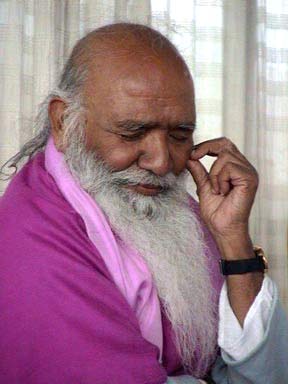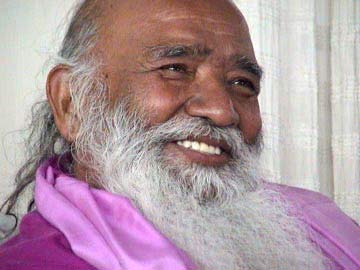Remember: I Am I
 Kaanti Prakash: ...The last few weeks, especially during meditation but
out of meditation as well, it was very clear that I had not changed and that
nothing had happened to Me. You had presented this so clearly that it was
very obvious. But then it became less clear that that Me is also in everything
or everyone. ... When I would look at someone else, it wouldn't be clear that
it was the same Me who I was looking at. Is there a way that I can engender
this knowledge more powerfully?
Kaanti Prakash: ...The last few weeks, especially during meditation but
out of meditation as well, it was very clear that I had not changed and that
nothing had happened to Me. You had presented this so clearly that it was
very obvious. But then it became less clear that that Me is also in everything
or everyone. ... When I would look at someone else, it wouldn't be clear that
it was the same Me who I was looking at. Is there a way that I can engender
this knowledge more powerfully?
Swamiji: This is not doubt. It is inquisitiveness about the nature of Me. I have already told you about all human beings, or about the mind, or the ocean of the mind. I would like to try to identify with your sense of individuality regarding the single waves of the ocean. A human being knows that each individual wave is other than water. At the same time, he knows that the wave cannot be other than water. I do not ask the ocean water or the wave "What do you think?" or "What do you know?" This is somehow to be unfolded. It is not necessary that you can succeed in the unfoldment; it may take time, but it happens.
What is the ocean of the mind ? It is your source of each thinking wave, of each thought wave, of millions of thought waves. So waves, which means thoughts, are all the ocean of the mind – the consciousness. So they are me. When I say "me," I use the word "me" known to human beings. Human beings know the word "me" because of their individual bodies: they all say "me" and they say "you." It is so ingrained in every being that "This is me and that is you." So he [Kaanti Prakaash] thinks, "I meditate, and I think that yes, the I is unchanging. But I do not grasp the me of others – whether it is changing or unchanging" – especially when he sees people changing all the time. Therefore, here [pointing to the body] he feels that "I am unchanging. But if I am unchanging, and I am one unchanging being, then on the level of their I all beings should also be unchanging. That's my doubt. Therefore, how should I know that me is also unchanging there? Therefore the statement that I made – that me is unchanging here – I also doubt that." Yet he says, "I'm very doubtless that I'm unchanging."
If you come to know one day that I am unchanging, why would you not know that everybody is unchanging, that every I is unchanging? If Me is unchanging, and Me is one ocean water, and in that Me one wave, Kaanti Prakaash, is there, then what is wrong with the Me-wave of somebody else? That is also water. You should understand Me in that way, stick to it, and abide by it. If you know Me is the source, and that is Oneness, then this has got to be learned. Is Oneness all individuals taken together, and then it is Oneness? If all waves are taken together, is it then Oneness? This should be studied. Oneness is that which an individual can be informed about: Oneness is that with which he knows. That with which he knows is what? The Knower. Where is the Knower in you? Me. Then why is the Knower-Me not everyone? Why is it not just the same Me who knows?
But this mind sometimes knows and sometimes does not know. That is the pain. That is the suffering. That is the doubt. That is where everybody expresses the result of their doubt. Because somewhere they know "I am unchanging" and somewhere they say "I am changing," and this does not give them complete satisfaction. They think, "If I am unchanging That, then this should also be unchanging. But I see this changing, even dying. Then, what should I do?" They are not able to reconcile this, to bring about the peace, or doubtlessness, of knowing that Unchanging is Unchanging. Whether waves change or do not change, the ocean water is unchanging. But a human being does not grasp this. When we say "does not grasp this," then we know he has his own imagination, a wave of his imagination, that he is this [only the body]. That is his imagination. And this imagination – which is imagination – he says is real. When it is real, then this imagination compels him to see that this body should remain permanently, because it is real. At the same time, he feels that it cannot be permanent. See what the human predicament is!
All of you are now very much aware of the fact that each human being knows "I should not die." There is this sense. So the sense says, "I should not die" – the sense! The sense should not die. But the body is dying; all the cells are dying. Then if somebody says that "You, the sense, and you, the body or cells, are the same," he is confused. He says, "Well look, I really don't want to die." But the doctor says, "You are going to die." He is confused and frightened. Why? Because he is a human being, and a human being has made the imagination real that "I exist as the body when I am awake, and I do not exist as the body, mind, or trouble when I am asleep." Imagination! Tomorrow you can say, "I am a race horse." [laughter] It does not mean that you can become a race horse. It is imagination. In the same way you think "I'm a girl." A race horse or a girl is just the same [laughter] – imagination. And I'm saying that I am I. Not only I say this, it is written over there [on the gate] in iron letters: IMI. Remember: I am I. But now you say, "What should I know about others?" Where are others when I is there? So then there is no question. But it does not mean that this is sorted out. Tomorrow, you can again ask. [laughter] The day after, you can again ask. It will happen, because it is a human being.

You have seen a monkey. Everything about a monkey looks like a human being, except that he surpasses because he has a tail. [laughter] Some people are like that. You show a monkey a banana: he understands. But if you show him a gold coin, he doesn't – though he can buy hundreds of bananas with it. [laughter] So human beings are like that. They understand something and they don't understand the precious thing. The precious thing is Me. Me is that Guru about which the girls were singing, "Guru sangh rehena." [Be tuned in with Guru] He [Kaanti Prakaash] also hears this, but he lives with me here and with other me's there. So "other" has come. From where has the sense of other come? In Me there cannot be any sense of waves – that they other than water. In the ocean, it will not be. But this is human consciousness. Human consciousness means that when it is awake it does not say that it was the same in sleep, because that is its nervous system. It knows a banana all right, but it does not know the gold coin. So we study human beings and come to know this. ...
It doesn't matter how many years it takes, but you must know from inside that Oneness has come. When Oneness has come, now what is there? Suppose you have the status of Bill Gates. Let me know, how much would you eat in one day? You are Bill Gates. He must be the owner of a couple of thousand rupees! [laughter] That's my banana consciousness. [laughter] Now, you are busy doing this, achieving this and that – and we have to achieve, because human beings are like that. How many human beings can you befool? You have already befooled enough. How many more young people are these politicians going to befool for the same thing? Somewhere somebody should know and say, "Well, that's enough. Boys and girls, do your work. Work has to be done, because the body has to go on and on. But do something with which you should remain enlightened and you should gain some knowledge with which you should not be further befooled." ... Human beings have been so befooled that they are not given the right knowledge. The right knowledge is, "You are born of Oneness, boys and girls. Therefore, you must not lose sight of Oneness." That's all. ... You are forever Me. Whether you live in California with your mom and brother or here, but Me is That. All three of them are Me. Why would you not know Me? Thank you.
Kaanti Prakash: The reality is what you say. I just really appreciate what you do for me, so thank you very much.
Copyright © 1999-2005 International
Meditation Institute. All Rights Reserved